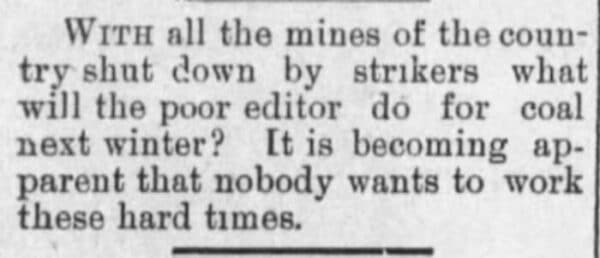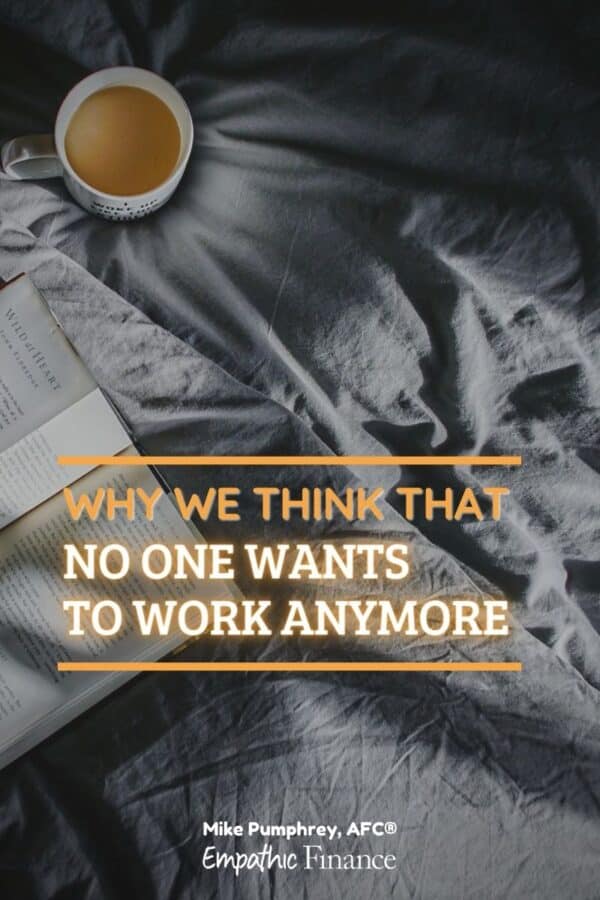The current ongoing staffing and labor shortages lead some to assume that no one wants to work anymore, but the reality is much more damning.
Recently, I was visiting a hotel and bar complex outside of Portland with my partner. This complex had a number of smaller bars, but many of them, almost half, were closed. We inquired when they might reopen, but we were told by a person (who we presumed was the manager) that those bars had been closed since the pandemic.
We were surprised. No one cares about the pandemic anymore, and despite COVID killing hundreds of people in the U.S. every week, most people it seems are content to just sort of “move on” and forget about it.
So we asked: Surely the pandemic wasn’t really a challenge for business anymore, right?
She replied: “We just can’t get staff. No one wants to work anymore.”
That first part of the sentence may be true, but the second half is about as wrong as you can get.
And yet, it’s a belief that persists. Why is that?
Table of Contents
No one wants to read statistics
Well it’s not the unemployment rate, that’s for sure.
According to official data, the unemployment rate is literally the same as pre-pandemic values.

Earlier this year, Reuters confirmed that the U.S. labor force gap is mostly back to pre-pandemic levels, meaning that we are at the same place had the pandemic not happened.
Now granted, a lot of people died over the past few years, so the same percentage of people might make for a different raw number. But still.
No one wants to accept reality
Some rationales are just silly.
Anecdotally, I’ve heard people say that this situation was because of the stimulus checks. I’m not joking. Some are still saying that people are not working because they received a few thousand dollars two years ago.
For reference, the average median rent in the country is over $2,000. Give me a break.
No one wants those jobs
I’ve had a sneaking suspicion that what’s been at stake recently is not a lack of jobs, or a lack of workers, but rather a lack of jobs that are worth taking.
After all, if you haven’t updated a job’s pay in the past year or two, I hate to say it, but you’re not paying enough.
With recent inflation, everything is more expensive. According to CNBC, prices overall are up 13% from two years ago.
So if you haven’t upped your wages at least 13% in that time, you’re giving workers less.
But it’s not just pay. My sneaking suspicion continues because I believe some jobs are less coveted these days.
After the rampant organized retail crime, and its associated risk of violence, would you want to work in a retail store?
And whole industries are suffering from attrition. For example, due to the glut of pandemic pets and associated burnout from abusive pet owners, we are in a massive veterinary shortage. There just aren’t enough vets anymore.
No one wants to check with the experts
I wasn’t surprised to see that Robert Reich, author and ex-U.S. Secretary of Labor, had much to say on this topic:
“[T]here is no labor shortage. There is a shortage of jobs paying sufficient wages to attract workers to fill them.
For most Americans, real inflation-adjusted wages continue to drop. Any pay increases workers may have earned in the past few years have actually been pay cuts, because wages have lagged behind the rising costs of basic necessities — like housing, food, childcare, and healthcare.
Instead of saying ‘no one wants to work anymore,’ we should be saying, ‘no one wants to be exploited anymore.'”
No one wants to pay a livable wage
You don’t have to look far to see that even white collar jobs are offering pay barely at a living wage.
I’ve done plenty of job searches through Indeed, LinkedIn, and others, and most of the jobs I’m finding have pay in the $40,000 to $60,000 range. And these are high-skilled jobs, not entry-level jobs! That may have worked fine for people a decade ago, but I don’t think that’s going to fly today.
Even financial counselor jobs (and this hits home) tend to be in the $50,000 range. Personally, I’d counsel people not to take those jobs.
But at least those are (barely) living wages.
No one wants to even post the jobs
I went to search out what this company (mentioned above) was asking for when looking for staff to reopen these bars.
Interestingly, there are no jobs listed for those positions. Evidently the company is just content to leave those positions unfilled. (Maybe it’s that the company doesn’t want to do the work anymore.)
But I searched for a similar job at a different location, and found that the work pays a little under $16 an hour, plus tips.
Now, I don’t know what tips you’re likely to make as a bartender in one of these places, but I can assure you that this isn’t likely to lead people to line up at your door. It’s not extortionate, but it’s not exceptional either. $15 an hour isn’t enough anymore.
No one wants to work since 1894
Lest we think that this is anything new, it is kind of an American tradition to blame workers for being lazy.
Someone put together a list of public opinions with the phrase “no one wants to work” going all the way back to 1894!

Well, what can I say? Maybe the dream of the 1890’s is alive and well here.
No one wants to work
Let’s be honest. In many ways, it’s true that no one wants to work!
Do you want to work at an unfulfilling job, being potentially exposed to abuse and even violence, for pay that isn’t keeping up with inflation?
No, I bet you don’t!
But we do anyway, because it’s hard to find another viable option.
So think hard before you point the finger at other people who you think “don’t want to work”. Maybe people are just tired of being exploited. I can’t blame them.




4 Comments
Ondina Hatvany
Great article Mike! Thanks for saying it like it is…; )
Mike Pumphrey
Thanks Ondina!
Anita
Agree with it all, it’s the same here in Australia. I have often thought ‘pay more, take less profit for yourself or shareholders, and you might get people’
Mike Pumphrey
Thanks! I know it seems so simple, but “find good people and pay them well” has always seemed to me to be the best solution. It’s never been satisfactorily explained to me why that doesn’t work.